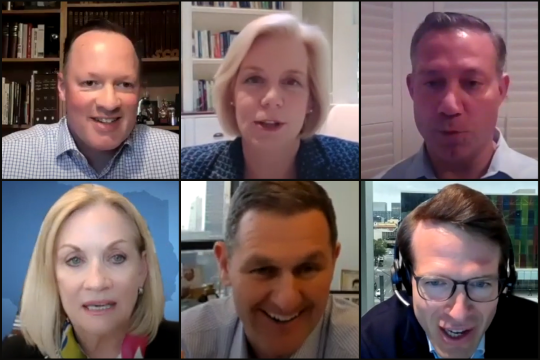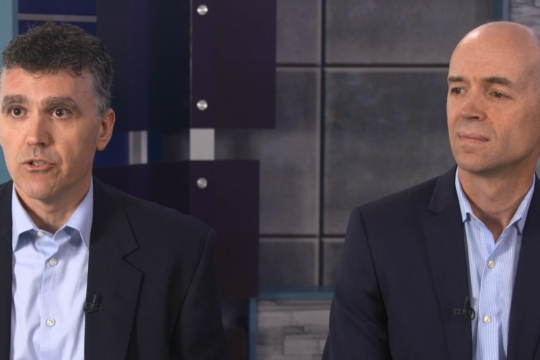
CPP Investments provides examples of why a focus on long-term outcomes and a multi-stakeholder approach to investing is a prerequisite to invest in the infrastructure asset class.

CPP Investments provides examples of why a focus on long-term outcomes and a multi-stakeholder approach to investing is a prerequisite to invest in the infrastructure asset class.
Infrastructure is vital for our societies and economies to function. Given the enormous need for investment, particularly considering the climate transition and development in low- and middle-income countries, institutional investors will be important stakeholders as governments seek to complement public spending.
Over the past few decades, long-term investors, such as pension funds and insurance companies, have been gradually drawn to the infrastructure asset class, which can provide attractive cash yields for investors long into the future. Total private investment in infrastructure has increased over the past decade, particularly through secondary market transactions which accounted for 75% of all private financing in 2019. Infrastructure investment also offers an opportunity for long-term investors to earn their required returns while also contributing to societies.
In his first State of the Union, U.S. President Biden touted an “infrastructure decade” following the passage of the Infrastructure Investment and Jobs Act in November 2021. Other global leaders, such as the heads of G7 and G20 governments and multi-lateral development banks, also regularly commit to enhancing infrastructure spending. Yet, it is easy to overlook the fact that private investment in infrastructure is a procurement option available to governments, and that private sector partners must demonstrate legitimacy as owners and operators of critical assets in order to maintain public confidence in business models.
Responsible behavior and a long-term approach are essential for infrastructure investors. Neglecting responsibilities — including those that extend beyond contractual or regulatory requirements, such as the well-being of communities or the health of markets, society and the planet — risk jeopardizing an organization’s social license to operate.
FCLTGlobal’s publication, Ripples of Responsibility: How Long-Term Investors Navigate Uncertainty with Purpose, explores investors’ multi-dimensional responsibilities and provides analysis on how to operationalize and communicate them, including toolkits to help them do so. The report notes that “communicating about responsibilities will be a component of fulfilling them for many long-term investment organizations because they will often need help from external collaborators and because the constituents that originated particular responsibilities will want verification.”
CPP Investments demonstrates this approach in Social License and the Infrastructure Investor with case studies from its own portfolio. Scott Lawrence, Managing Director and Head of Infrastructure for CPP Investments and an author of the report notes, “operators of, and investors in, infrastructure assets depend on social license to create and maintain conducive operating environments.”
Social license begets trust. That trust builds legitimacy and allows infrastructure investors in the private sector to operate in a realm that is often considered the domain of the public sector.
“Infrastructure companies typically provide essential services to a large customer base, sometimes on a monopoly basis with guaranteed customers, making them priorities for local communities and public-sector stakeholders… If operators of monopolistic assets do not consider the role social license can play in making or breaking their reputation, they may struggle to attract the best and brightest talent, find it harder to operate, and diminish their appeal when investing in (or bidding for) new projects”, according to CPP Investments.
Through case studies, CPP Investments offers examples from its portfolio companies of how social license functions in practice, and how having a long-term focus on maintaining social license through responsible stewardship can lead to good long-term business outcomes. In one example noted by CPP Investments, prioritizing public safety through proactive maintenance helped to build public trust for a toll road concession.
According to CPP Investments, “actions taken to improve safety on toll roads required additional investment that was not specifically mandated by the contract. CPP Investments supported this expense because it improved safety and led to greater road utilization, and thus profitability, and showed commitment to being a long-term investor in the community. This helped to protect lives, preserve long-term value — and build social license.”
It is also incumbent on investors to demonstrate that the cost of services provided are reasonable and affordable to the public. In infrastructure, contracts are written to provide a fair return, but over long investment horizons, conditions can change. The investment framework may evolve, which could alter the affordability of investment.
CPP Investments describes how toll escalations were becoming increasingly untenable in a portfolio investment in Chile, and how the contract was renegotiated:
“Grupo Costanera successfully lengthened the term of the contract — providing access to a longer-lived asset — in exchange for lowering future toll hikes. Economically, the change made sense, but more importantly, over the long term, the move both improved public trust in the asset and management’s relationship with the government.”
Understanding and acting on investor responsibilities contributes to good business decisions, even if it requires forgoing near-term profits in favor of long-term value creation.
| Canada Pension Plan Investment Board (CPP Investments™) is a professional investment management organization that manages the Fund in the best interest of the more than 21 million contributors and beneficiaries of the Canada Pension Plan. CPP Investments is a co-founder of FCLTGlobal and launched the CPP Investments Insights Institute to create enduring value by using CPP Investments’ global investing expertise, partnerships, and convening power to advance how the global investment ecosystem addresses climate change, technology disruption and evolving stakeholder expectations.
FCLTGlobal’s mission is to focus capital on the long term to support a sustainable and prosperous economy. We are a non-profit organization whose members are leading companies and investors worldwide that develops actionable research and tools to drive long-term value creation for savers and communities. We welcome your input into FCLTGlobal’s broader, ongoing project on investors’ rights and responsibilities, particularly on how it is relevant for the infrastructure asset class. For questions or suggestions, please contact Research Director Joel Paula at [email protected]. |

Climate | Video
21 May 2021 - The world’s infrastructure systems face critical challenges as we look to meet the needs of a growing, increasingly urban population while at the same time dramatically reducing carbon emissions. Technological advances and the Covid-19 epidemic have expanded our conception of critical infrastructure, as telecommunications and other resources become imperative to people and economies around the world.

Risk and Resilience, Climate | Article
23 August 2021 - By Matthew Leatherman The U.S. House of Representatives is heading toward a vote on a trillion-dollar infrastructure bill, including numerous program reauthorizations and $550 billion in new spending. From across the northern border, the reaction from John Graham, President and CEO of Canada Pension Plan (CPP) Investments, is about how to “increase spending even beyond that amount.” These are eye-watering numbers and Graham is right. Massive additional sums will be needed for climate resilience, complete removal of lead from water lines, restoration for communities of color severed by...

Risk and Resilience | Video
9 July 2019 - An interview with with Rocky Ieraci and Steven Richards from the Canada Pension Plan Investment Board.